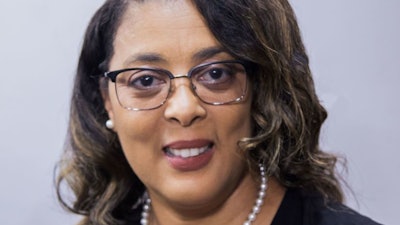When it comes to nursing and nursing education, Dr. Tiffany D. Morris has seen and done almost everything over her 30-year career.
When some might consider slowing down, Morris is steady going. She recently accepted a new position as director of nursing and the Clara Adams Ender Endowed Associate Professor at North Carolina Agricultural and Technical State University, a public historically Black college and university (HBCU) in Greensboro, N.C.
 Dr. Tiffany D. Morris
Dr. Tiffany D. Morris
Graduating with a BSN from the University of Virginia, Morris went on to earn an MSN in nursing education and administration from the University of Phoenix, an MS Ed in higher education from Capella University, and a DNP in executive leadership from Grand Canyon University. She’s been lauded for her work, topped with recognition as 2022’s Nurse Leader of the Year by the Carolina Nurses League.
For Morris, becoming a nurse educator was a dream that was developed at a young age.
"There were two things I wanted to do when I grew up,” she said. “It was to be a nurse or a teacher. And nursing has afforded me the opportunity to do both as a nurse educator. It was the best thing that happened to me, being able to culminate my compassion for people and my compassion for students into one dynamic career."
Morris credits her aunt, who was an “amazing, compassionate nurse” that she looked up to as a role model, for helping her along her career path. She shined a light on the importance of providing quality healthcare.
“The most important lesson that I've learned as a nurse is to embrace an individual's reality in terms of their culture, background, and spirituality,” she said. “You cannot separate who a person is from managing their healthcare effectively."
It’s that kind of thinking that exemplifies a “spirit of excellence” in her work, said Dr. Titilayo Evans, director of student services in the School of Nursing at NC A&T and a longtime colleague of Morris.
“That really encompasses who she is overall,” said Evans. “Everything that she does, is done in excellence. Whether that's in the classroom, in administration, or simply planning or executing an activity for the nursing students, she always operates in excellence."
The new role at NC A&T marks a welcome return to the HBCU for Morris. She previously held various roles for multiple years in the nursing school and at the university in general, including serving as a clinical assistant professor, interim nursing dean, interim assistant nursing dean, and accelerated BSN option coordinator.
NC A&T’s nursing school holds three principles in high regard: accountability, professionalism, and responsibility. And Morris embodies all three, said Janice Fisher, executive assistant for the school.
“She is charming. She exudes brightness and positivity,” said Fisher. “And she's a role model. She does not expect anything from us or the students that she is not willing to do herself.”
As a decades-long healthcare professional, Morris also has ample experience with epidemics and pandemics. She started her nursing career amid the height of the HIV crisis that devastated the nation.
"People were afraid. [There were] all types of misnomers about the disease,” recalls Morris. “And so, when COVID-19 hit, it took me back there for a moment. The good news was that I was not fearful.”
Instead, she spent time administering the vaccine and assisting communities distrustful of government, informing them that the vaccine was safe and necessary to curtail the pandemic.
Despite having an abiding love for the profession, Morris said the industry still struggles with burnout and shortages, partly due to a lack of nursing educators and ever-increasing workloads placed on nurses.
"When you go to a regular nursing unit, you might have six or seven patients,” said Morris, adding that it is the sheer volume – not the intensity of the work – that is mentally, emotionally, and physically taxing. Because of that, she said, the next 15 years in nursing education will be critical to preparing the next generation of practitioners.
"Serving as the director for a nursing program that's the largest HBCU in the U.S. is particularly special to me because I've been given the opportunity to give to a community that can make a difference in improving health equity and reducing health disparities,” said Morris. “I hope to use my time here to increase that literacy among all communities,” she continues. “I really hope that the legacy that we leave is that NC A&T will impact the future of healthcare in a major way."















